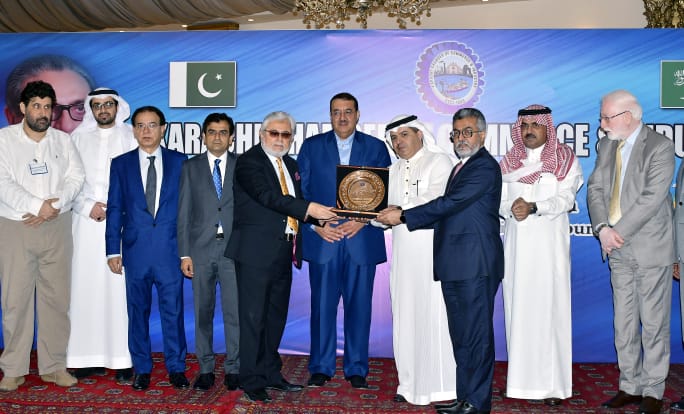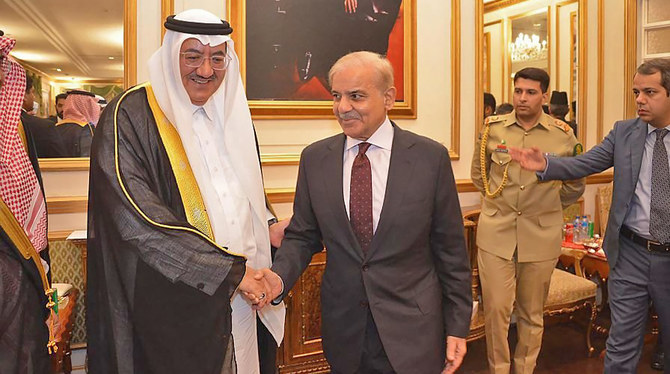ISLAMABAD: A week-long visit to Pakistan by a Saudi business delegation had created new opportunities for collaboration and partnership agreements were expected to be signed in several sectors, a senior Saudi diplomat said on Tuesday, while the president of the Federation of Pakistan Chambers of Commerce and Industry said negotiations to sign a Pak-Gulf Cooperation Council Free Trade Agreement were at an “advanced stage.”
The 15-member delegation, nominated by the Saudi government and led by Fahad Bin Muhammad Al-Bash, the chairman of the Saudi-Pak Business Council, arrived in Pakistan on June 20 to explore investments and joint ventures. While in Pakistan, the group visited Islamabad, Lahore, Sialkot, Faisalabad, and Karachi and met representatives from various chambers of commerce and the board of investment, as well as conducted business-to-business meetings in each city. The group also visited factories in Sialkot, Faisalabad and Karachi, before flying out to the kingdom on June 27.
After the conclusion of the visit, Irfan Iqbal Sheikh, president of the Federation of Pakistan Chambers of Commerce and Industry, said in a statement negotiations to sign Pak-GCC FTA were at an “advanced stage.”
“Pakistan should target IT & IT-enabled services exports to Saudi Arabia; along with skilled workforce in Information and Communication Technologies (ICT),” Sheikh said in a statement released by the FPCCI.
“Value-added textiles, leather products, footwear, handicrafts, sports goods, pharmaceuticals, surgical goods, gems & jewelry, rice, fruits & vegetables and construction materials can fetch major additional orders from Saudi Arabia worth billions of dollars annually.”

Saudi business delegation visits Happilac Paints factory in Faisalabad, Pakistan, on June 23, 2022. (Photo courtesy: Saudi embassy, Islamabad)
Sheikh added that this was the “only sustainable way” to curtail Pakistan’s trade deficit, which is expected to be close to $48 billion when the final figures come out for fiscal year 2021-22.
Azhar Ali Dahar, the trade and investment minister at the Pakistani embassy in Riyadh, said the recent trade visit reflected the Saudi government’s desire to deepen economic relations with Pakistan.
“They [Saudi delegation] have a plan to ask the Saudi government to establish a Pak-Saudi investment body to streamline collaborations between both countries’ businessmen,” Dahar told Arab News.
Mubsher Alshehri, a commercial attaché at the Saudi embassy in Islamabad, told Arab News partnership agreements were expected to be concluded in various sectors including FinTech [financial technology], paints, renewable energy, and construction, as well as the production sector of livestock, rice, and feed.
Muhammad Idrees, the president of the Karachi Chamber of Commerce and Industry (KCCI), said the visit had changed the Saudi perception of the business landscape in Pakistan as well as Karachi, its financial hub.
“They have shown their interest in establishing joint ventures in coastal tourism and construction,” Idrees said, adding that the Saudi businessmen were interested in introducing new brands of international standard garments for exports to Gulf countries.
“They have also invited us to exhibit our products in Saudi Arabia and it was decided to nominate a focal person on both sides to coordinate this event where our businessmen will visit the kingdom to show their products,” the KCCI president added.

Officials of Karachi Chamber of Commerce and Industry meet Saudi-Pak Business Council members in Karachi, Pakistan, on June 28, 2022. (@CommissionerKhi/Twitter)
Fayyaz Ahmed, vice president of the Faisalabad Chamber of Commerce and Industry, said the Saudi businessmen had shown “keen interest” in the textile and paint industry.
“The Saudi delegation visited a textile and paint factory in Faisalabad where they have shown satisfaction over the quality and standard of our products,” he told Arab News, hoping this would soon translate into collaborations and joint ventures.
Al-Bash, chairman of Saudi-Pak Business Council, was quoted in an FPCCI statement as inviting “practical proposals” from the Pakistani business community for “swift and tangible development on projects of mutual interest.”
“Pakistani rice, spices, fruits and cuisine are very popular in Saudi Arabia and Pakistani exporters should come forward for a bigger market share,” Al-Bash said.
Junaid Makda, Chairman of FPCCI's Pak-Saudi Arabia Joint Business Council, said after the COVID-19 pandemic, which had been a major obstacle in people-to-people, business-to-business and chamber-to-chamber contacts between the two countries, the two sides had agreed on regular contact and single-country trade fairs and exhibitions.
“He also requested Saudi authorities to facilitate Pakistani businessmen with the swift visa processing and simpler documentation requirements for exports to the kingdom,” the FPCCI said.
















